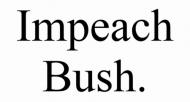Reign of Error
By Paul Krugman
The New York Times
 Amid everything else that’s going wrong in the world, here’s one more piece of depressing news: a few days ago the Harris Poll reported that 50 percent of Americans now believe that Iraq had weapons of mass destruction when we invaded, up from 36 percent in February 2005. Meanwhile, 64 percent still believe that Saddam had strong links with Al Qaeda.
Amid everything else that’s going wrong in the world, here’s one more piece of depressing news: a few days ago the Harris Poll reported that 50 percent of Americans now believe that Iraq had weapons of mass destruction when we invaded, up from 36 percent in February 2005. Meanwhile, 64 percent still believe that Saddam had strong links with Al Qaeda.
At one level, this shouldn’t be all that surprising. The people now running America never accept inconvenient truths. Long after facts they don’t like have been established, whether it’s the absence of any wrongdoing by the Clintons in the Whitewater affair or the absence of W.M.D. in Iraq, the propaganda machine that supports the current administration is still at work, seeking to flush those facts down the memory hole.
But it’s dismaying to realize that the machine remains so effective.
Here’s how the process works.
First, if the facts fail to support the administration position on an issue — stem cells, global warming, tax cuts, income inequality, Iraq — officials refuse to acknowledge the facts.
Sometimes the officials simply lie. “The tax cuts have made the tax code more progressive and reduced income inequality,” Edward Lazear, the chairman of the Council of Economic Advisers, declared a couple of months ago. More often, however, they bob and weave.
Consider, for example, Condoleezza Rice’s response a few months ago, when pressed to explain why the administration always links the Iraq war to 9/11. She admitted that Saddam, “as far as we know, did not order Sept. 11, may not have even known of Sept. 11.” (Notice how her statement, while literally true, nonetheless seems to imply both that it’s still possible that Saddam ordered 9/11, and that he probably did know about it.) “But,” she went on, “that’s a very narrow definition of what caused Sept. 11.”
Meanwhile, apparatchiks in the media spread disinformation. It’s hard to imagine what the world looks like to the large number of Americans who get their news by watching Fox and listening to Rush Limbaugh, but I get a pretty good sense from my mailbag.
Many of my correspondents are living in a world in which the economy is better than it ever was under Bill Clinton, newly released documents show that Saddam really was in cahoots with Osama, and the discovery of some decayed 1980’s-vintage chemical munitions vindicates everything the administration said about Iraq’s weapons of mass destruction. (Hyping of the munitions find may partly explain why public belief that Saddam had W.M.D. has made a comeback.)
Some of my correspondents have even picked up on claims, mostly disseminated on right-wing blogs, that the Bush administration actually did a heck of a job after Katrina.
And what about the perceptions of those who get their news from sources that aren’t de facto branches of the Republican National Committee?
The climate of media intimidation that prevailed for several years after 9/11, which made news organizations very cautious about reporting facts that put the administration in a bad light, has abated. But it’s not entirely gone. Just a few months ago major news organizations were under fierce attack from the right over their supposed failure to report the “good news” from Iraq — and my sense is that this attack did lead to a temporary softening of news coverage, until the extent of the carnage became undeniable. And the conventions of he-said-she-said reporting, under which lies and truth get equal billing, continue to work in the administration’s favor.
Whatever the reason, the fact is that the Bush administration continues to be remarkably successful at rewriting history. For example, Mr. Bush has repeatedly suggested that the United States had to invade Iraq because Saddam wouldn’t let U.N. inspectors in. His most recent statement to that effect was only a few weeks ago. And he gets away with it. If there have been reports by major news organizations pointing out that that’s not at all what happened, I’ve missed them.
It’s all very Orwellian, of course. But when Orwell wrote of “a nightmare world in which the Leader, or some ruling clique, controls not only the future but the past,” he was thinking of totalitarian states. Who would have imagined that history would prove so easy to rewrite in a democratic nation with a free press?
The New York Times
 Amid everything else that’s going wrong in the world, here’s one more piece of depressing news: a few days ago the Harris Poll reported that 50 percent of Americans now believe that Iraq had weapons of mass destruction when we invaded, up from 36 percent in February 2005. Meanwhile, 64 percent still believe that Saddam had strong links with Al Qaeda.
Amid everything else that’s going wrong in the world, here’s one more piece of depressing news: a few days ago the Harris Poll reported that 50 percent of Americans now believe that Iraq had weapons of mass destruction when we invaded, up from 36 percent in February 2005. Meanwhile, 64 percent still believe that Saddam had strong links with Al Qaeda.At one level, this shouldn’t be all that surprising. The people now running America never accept inconvenient truths. Long after facts they don’t like have been established, whether it’s the absence of any wrongdoing by the Clintons in the Whitewater affair or the absence of W.M.D. in Iraq, the propaganda machine that supports the current administration is still at work, seeking to flush those facts down the memory hole.
But it’s dismaying to realize that the machine remains so effective.
Here’s how the process works.
First, if the facts fail to support the administration position on an issue — stem cells, global warming, tax cuts, income inequality, Iraq — officials refuse to acknowledge the facts.
Sometimes the officials simply lie. “The tax cuts have made the tax code more progressive and reduced income inequality,” Edward Lazear, the chairman of the Council of Economic Advisers, declared a couple of months ago. More often, however, they bob and weave.
Consider, for example, Condoleezza Rice’s response a few months ago, when pressed to explain why the administration always links the Iraq war to 9/11. She admitted that Saddam, “as far as we know, did not order Sept. 11, may not have even known of Sept. 11.” (Notice how her statement, while literally true, nonetheless seems to imply both that it’s still possible that Saddam ordered 9/11, and that he probably did know about it.) “But,” she went on, “that’s a very narrow definition of what caused Sept. 11.”
Meanwhile, apparatchiks in the media spread disinformation. It’s hard to imagine what the world looks like to the large number of Americans who get their news by watching Fox and listening to Rush Limbaugh, but I get a pretty good sense from my mailbag.
Many of my correspondents are living in a world in which the economy is better than it ever was under Bill Clinton, newly released documents show that Saddam really was in cahoots with Osama, and the discovery of some decayed 1980’s-vintage chemical munitions vindicates everything the administration said about Iraq’s weapons of mass destruction. (Hyping of the munitions find may partly explain why public belief that Saddam had W.M.D. has made a comeback.)
Some of my correspondents have even picked up on claims, mostly disseminated on right-wing blogs, that the Bush administration actually did a heck of a job after Katrina.
And what about the perceptions of those who get their news from sources that aren’t de facto branches of the Republican National Committee?
The climate of media intimidation that prevailed for several years after 9/11, which made news organizations very cautious about reporting facts that put the administration in a bad light, has abated. But it’s not entirely gone. Just a few months ago major news organizations were under fierce attack from the right over their supposed failure to report the “good news” from Iraq — and my sense is that this attack did lead to a temporary softening of news coverage, until the extent of the carnage became undeniable. And the conventions of he-said-she-said reporting, under which lies and truth get equal billing, continue to work in the administration’s favor.
Whatever the reason, the fact is that the Bush administration continues to be remarkably successful at rewriting history. For example, Mr. Bush has repeatedly suggested that the United States had to invade Iraq because Saddam wouldn’t let U.N. inspectors in. His most recent statement to that effect was only a few weeks ago. And he gets away with it. If there have been reports by major news organizations pointing out that that’s not at all what happened, I’ve missed them.
It’s all very Orwellian, of course. But when Orwell wrote of “a nightmare world in which the Leader, or some ruling clique, controls not only the future but the past,” he was thinking of totalitarian states. Who would have imagined that history would prove so easy to rewrite in a democratic nation with a free press?












